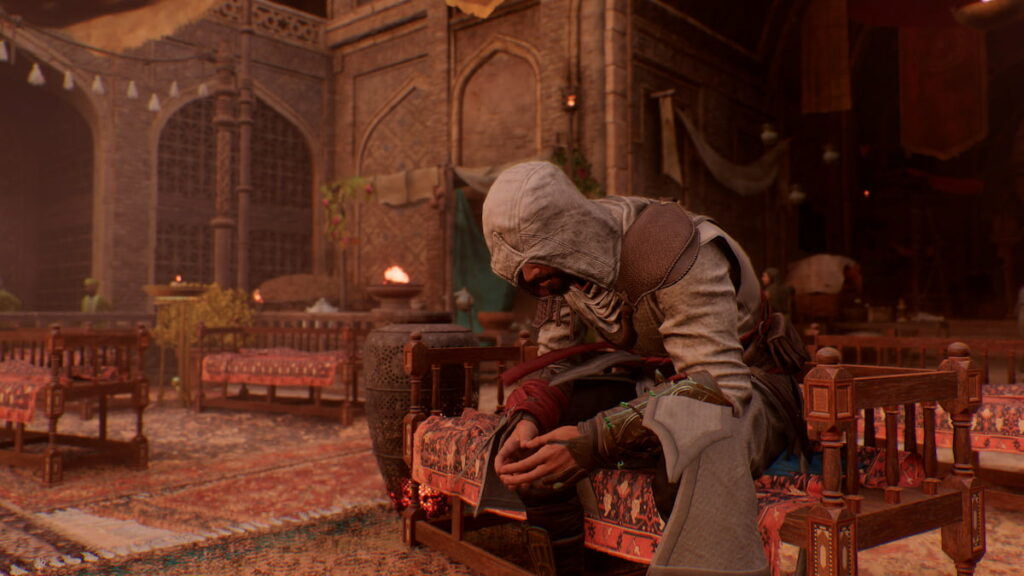
Image source: Ubisoft
Years of rinse and repeat have already seen the Assassin’s Creed franchise reinvent itself once, and now the same situation is forcing another evolution. Or is it a devolution? Assassin’s Creed Mirage is Ubisoft’s attempt to bring the series back to its roots, abandoning the RPG formula in favor of a stealth-action approach on which the iconic brand originally forged a name for itself.
Assassin’s Creed Nostalgia
Earlier this week, for the very first time, Mirage was showcased to the public at Ubisoft Forward 2023. What we saw was exactly as advertised; a return to “old-school” gameplay mechanics and a distinctly AC1-like aesthetic that is likely to have many veteran fans cheering in approval. It’s being billed as fresh but familiar, a nod to the past to tug on nostalgia strings and at the same time recentre the series’ chi. The demo certainly convinces me it’s likely to succeed in achieving some of that. There are problems, however.
Assassins Creed Mirage appears to on one hand take us back to basics and on the other still feature all the bloat of more recent entries — bloat that made some semblance of sense in the context of a massive role-playing game but definitely won’t in something more akin to the original trilogy. The special powers, numerous abilities, crafting mechanics, resource farming, looting, and everything else you’d expect in an RPG. But in a stealth-action game? Not so much.
Of course, it’s only natural Ubisoft is seeking to evolve the original stealth gameplay by incorporating elements from newer entries. But do we need auto-assassinate special moves that have Basim teleporting across the map? Is that clever innovation or lazy design? I’m not so sure.
Balancing Expectations
Don’t get me wrong, I’m excited for Mirage. As much as Ubisoft’s ability to transform Assassin’s Creed from an action game to RPG with Origins, Odyssey, and Valhalla, the blueprint is now tired. I think I’ve had my fill of level grinding and looting for many years to come. But I don’t think the next step for the series is so simple as delivering a blast from the past with added bells and whistles. I’m concerned the novelty won’t last a 30-hour gameplay experience, let alone the 80-hour experience Ubisoft is going to deliver.
he core of the issue is Ubisoft having to wrestle expectations of long-time fans who yearn for a return to the franchise’s core values with the demands of a broader gaming audience accustomed to the expansive worlds and intricate mechanics found in recent Assassin’s Creed titles. It’s not an easy thing to navigate; I don’t envy the development team, and I don’t have the answers.
What I’m sure of, though, is that the studio must resist the temptation to incorporate superfluous features that would detract from the purity of the experience they are trying to recapture. Mirage should strive to be a streamlined and focused adventure, where every gameplay element serves a purpose and contributes to the overall immersion.

Moreover, the development team needs to put a priority on quality storytelling. Assassin’s Creed lore is notoriously convoluted. It’s time for the series to deliver a narrative that is compelling and coherent in a way that explores the original lore without becoming overly bogged down by its peculiarities. I know, I know — for many, the peculiarities are part of the charm. I just think if we’re going for a reboot with Mirage then it’s worth first and foremost cutting down the clutter. Most importantly, it should resonate with players on an emotional level.
Ultimately, the success of Assassin’s Creed Mirage hinges on Ubisoft’s ability to learn from past missteps. I want to see the publisher embrace the essence of the series without succumbing to the temptations of excess. By returning to its roots while carefully curating its gameplay and narrative elements, Mirage has the potential to reinvigorate the franchise. My hope is that Ubisoft can remind players why they fell in love with Assassin’s Creed without adding too many unnecessary bells and whistles.





